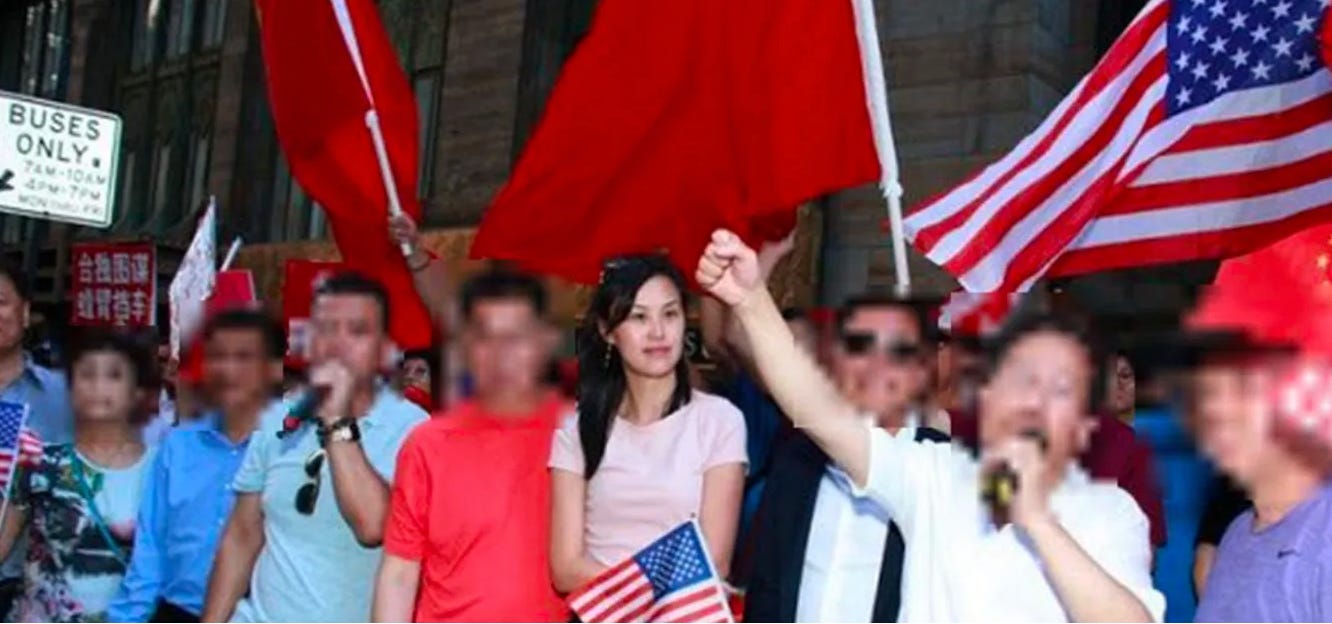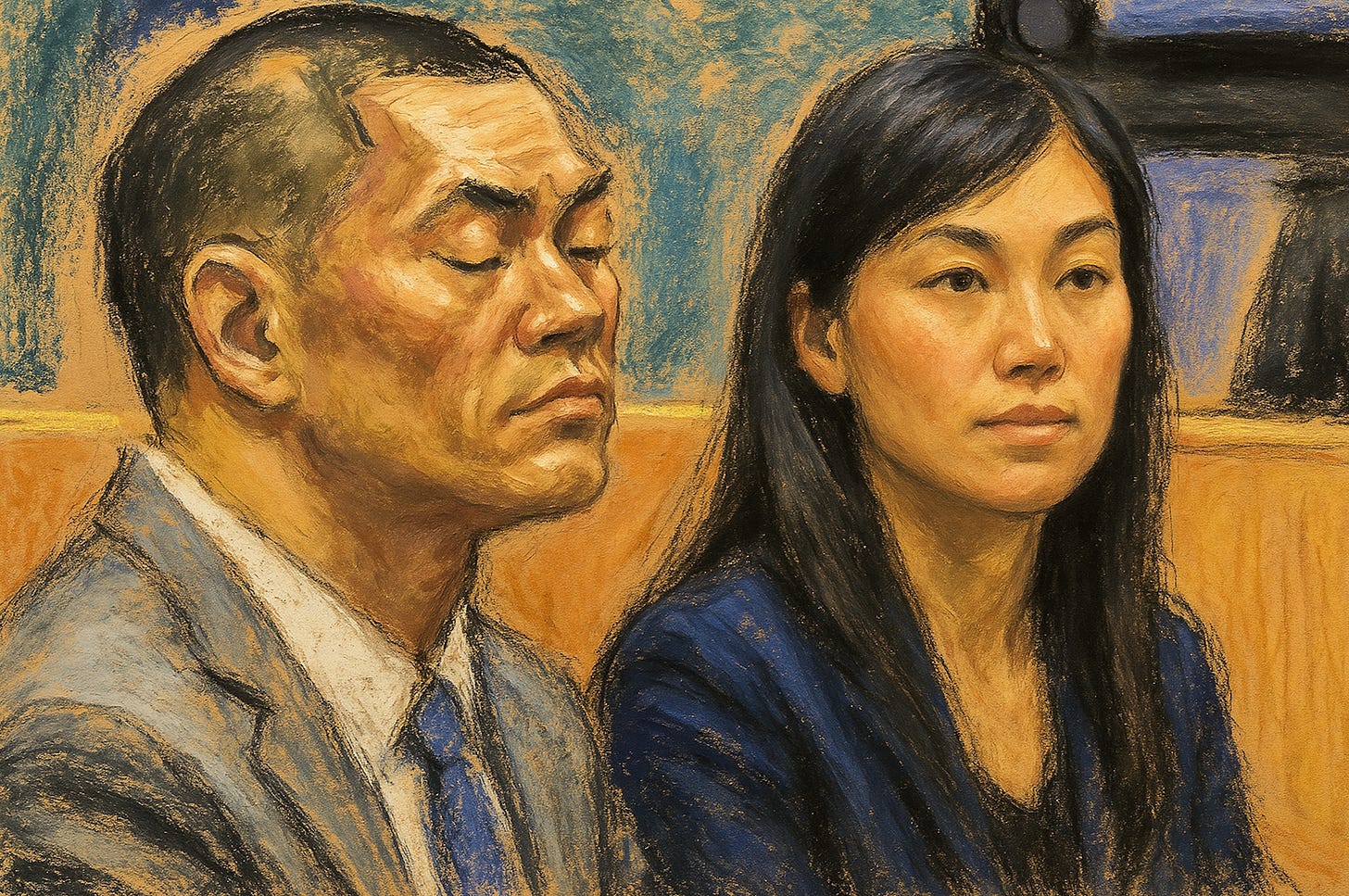Salted Ducks and a 95 Percent Conviction Rate: Legal Analysis of the Linda Sun China Corruption Trial
“If There’s Any One Thing You Might Remember Most, It’s the Salted Ducks”: A Criminal Defense Lawyer’s Take on the Linda Sun China Corruption Trial.
BROOKLYN – U.S. government lawyers told a Brooklyn jury this week that longtime New York political aide Linda Sun’s “loyalty was for sale” to Beijing. Sun was a public servant, they say, who continued selling her access to governors Andrew Cuomo and Kathy Hochul even after a face-to-face FBI interview in 2020, when an agent warned her that a consular “overseas Chinese affairs” official she dealt with was actually an intelligence officer targeting diaspora leaders.
In that meeting, the agent also explained that Beijing uses travel, honours and money to co-opt people in her position. Despite that warning, prosecutors say, and after being briefed on the Foreign Agents Registration Act, which requires anyone acting at the direction of a foreign government to register with the Justice Department, Sun and her husband, Chris Hu, turned her state job into a clandestine business that bought a Long Island mansion, a Hawaii condo and luxury cars for herself and her family, in what prosecutors describe as “a case about greed and betrayal.”
In an interview Friday, Samuel Bassett, a criminal defense lawyer from Austin, told The Bureau this is an extraordinary case, because few political corruption cases in the United States allege a foreign power is behind millions in bribes.
He said that, if Sun is convicted, it will likely be because of the luxurious rewards prosecutors have detailed, noting that “jurors tend to hang their hat on evidence such as purchases of large dollar items, and extravagant expenses that aren’t readily explained.” If prosecutors can prove Sun’s family amassed undisclosed wealth, he added, “then you’re there as far as the conviction with most jurors, emotionally.”
“Federal prosecutors have a 95, I think, percent conviction rate,” Bassett said. “And I really don’t see this being one of the 5% cases unless the defense has some sort of strong evidence that the proceeds used [by Linda Sun’s family] were generated by legitimate business practices of her husband.”
Sun and Hu, charged with laundering bribes and kickbacks through his companies, answered the prosecution’s narrative with a different story. In opening statements, their lawyers said Sun was a hard-working immigrant official who received culturally appropriate gifts from Chinese contacts, while Hu was a self-made businessman who pivoted into pandemic PPE sales when his seafood business collapsed due to Covid-era restrictions. Prosecutors, Hu’s lawyer argued, had simply “misunderstood hard work as money laundering.”
Over the first two days of trial, federal prosecutors called a string of witnesses, including FBI and Homeland Security agents, a State Department official, and the former chief of staff to Lieutenant Governor and later Governor Hochul.
In opening statements and preliminary evidence, they began to flesh out the details of a complex and politically sensitive case with clear implications for U.S.–China relations. They laid out how federal agents warned Sun in 2020 that she was on the radar of a Chinese intelligence officer; how New York staff say she forged Hochul’s name on invitation letters used to obtain U.S. visas for Chinese delegations; and how, behind the scenes, she worked to freeze out Taiwan’s representatives while cultivating Beijing’s allies.
According to the U.S. government, Sun was not just another Albany operator. As a senior aide handling Asian and immigrant outreach for Cuomo and Hochul, she sat at the junction of campaign politics, community groups and foreign consulates. Prosecutors say she secretly acted at the direction of officials and community leaders linked to the People’s Republic of China, steering access, policy gestures and pandemic contracts in ways that advanced Beijing’s interests while making her family rich.
In a vivid example, the jury was slowly walked through video evidence by an FBI agent in a way that, The Bureau’s analysis suggests, could be replicated and tested in courts across Western capitals from Vancouver and Toronto to Sydney and London.

Footage played by prosecutors showed Sun attending a series of events hosted by pro-Beijing community leaders, including a 2019 rally protesting Taiwanese President Tsai Ing-wen’s transit through New York, and celebrations marking the 70th anniversary of the founding of the People’s Republic of China and the 40th anniversary of U.S.–China diplomatic relations. In one clip, Sun can be seen smiling and nodding beside a pro-Beijing community leader as he leads chants of “Down with Taiwan, down with Tsai Ing-wen.”
The indictment alleges that during COVID-19, Sun leveraged her state procurement role to steer multimillion-dollar PPE deals to companies controlled by Hu and his relatives, with kickbacks flowing back to the couple. To launder those profits, prosecutors say, Hu cycled money through shell companies and accounts opened in the names of Sun’s parents and other relatives.
At the same time, the government says, Sun used her post to block Taiwan’s representatives from the governor’s office, shape state messaging to match Beijing’s red lines, and help ensure New York’s public remarks highlighted China’s pandemic assistance — and, more concretely, to grease the path for delegations from Chinese provinces such as Jiangxi and Henan, allegedly going so far as to forge Hochul’s name on official invitation letters used to secure U.S. visas.
In court this week, prosecutors began trying to show that none of this was naïve.
The most striking testimony on Day One came from FBI Special Agent Garrett Igo, who described sitting across from Sun at her home on July 15, 2020, as part of an investigation into Chinese government political-influence operations in New York.
According to Igo, the FBI already had Sun’s network mapped out: her years of dealings with the Chinese consulate in New York and her relationship with Qing Li, a consular “overseas Chinese affairs” official. In the FBI’s view, Li was not a diplomat, but an intelligence officer, tasked with monitoring overseas Chinese communities and targeting the so-called “five poisons”: Taiwanese independence supporters, Tibetans, Falun Gong, Uyghurs and democracy activists.
On the stand, Igo testified that he explicitly told Sun that Li was an intelligence officer and walked her through a roughly 300-page Hoover Institution report on “malign influence” by the Chinese state. The document laid out how Beijing courts community leaders and local officials with trips, honours and financial benefits in exchange for loyalty and silence on Taiwan and other sensitive issues.
He also told jurors that he took time in that meeting to explain the Foreign Agents Registration Act, making clear that anyone acting at the direction or control of a foreign government in the United States is required to register.
According to Igo, Sun acknowledged knowing Li and other consulate officials, having them on her WeChat contacts, and interacting at banquets and community events. But when agents compared her answers to the government’s evidence, prosecutors told the jury, key things were missing.
Prosecutors used their opening statement to sketch what they say was the hidden side of Sun’s bargain — not only what she did for Beijing-aligned actors, but what they allegedly gave her in return.
They told jurors the evidence will show a steady flow of benefits, from trips to China with expenses covered or quietly subsidized, to tickets and political access, to help steering business toward Hu, and even culinary perks. One detail stood out: “Nanjing-style salted ducks” prepared by a Chinese official’s personal chef and delivered to Sun’s parents’ home, a flourish that, for prosecutors, illustrates how deeply woven Sun had become into a circle of favoured contacts.
Samuel Bassett, the Texas criminal-defense lawyer, said it will likely be the granular, emotive details in the prosecution’s case — such as gifting Nanjing duck to Sun’s family — that register most with jurors.
“There’s no question, a lot of jurors, maybe even most jurors start their decision making emotionally,” he said. “In my experience, and I’m assuming some of the jurors are everyday working people who work for a salary and kind of barely get by in the New York area with whatever they make, and they see this and they have an emotional reaction to the unfairness of it in using your governmental position to unfairly enhance your wealth. If there’s any one thing that you might remember most, it’s the salted ducks. It’s that type of fact that turns these cases strongly in favor of the prosecution.”
The tangible core of the case, prosecutors have pledged, will come from documents — bank records, internal emails and a spreadsheet found on a computer tied to Sun and Hu, tracking millions in PPE deals and profits in meticulous rows.
As The Bureau has reported from the government’s filings, prosecutors are also seeking to introduce a chart to walk jurors through a web of millions in complex cross-border transactions in the seafood businesses between Hu and a relative in Guangdong, who runs an import–export operation in China. Hu’s lawyer has pushed back hard, arguing there is no evidence the relative is any kind of proxy for the Chinese government, and insisting the transfers reflect ordinary commercial dealings in a family business, not a laundering scheme.
Phone search at JFK and a tale of two letters
Another federal agent, Homeland Security Investigations Special Agent Matthew Harris, testified about a stop at JFK Airport in January 2020 involving a former president of a Henan hometown association in New York.
Harris told the court that when the association leader returned from China, agents questioned him, briefly seized two of his phones, imaged the data and returned the devices the same day. Prosecutors have not yet walked jurors through what those phones contained, but, as The Bureau has reported from earlier filings, that search appears to be part of the chain of evidence linking Henan community leaders – the unnamed “co-conspirators” in the indictment – to Sun and Hu’s alleged kickback scheme and to Henan provincial delegations that travelled into the United States with Sun’s help.
Keep reading with a 7-day free trial
Subscribe to The Bureau to keep reading this post and get 7 days of free access to the full post archives.



